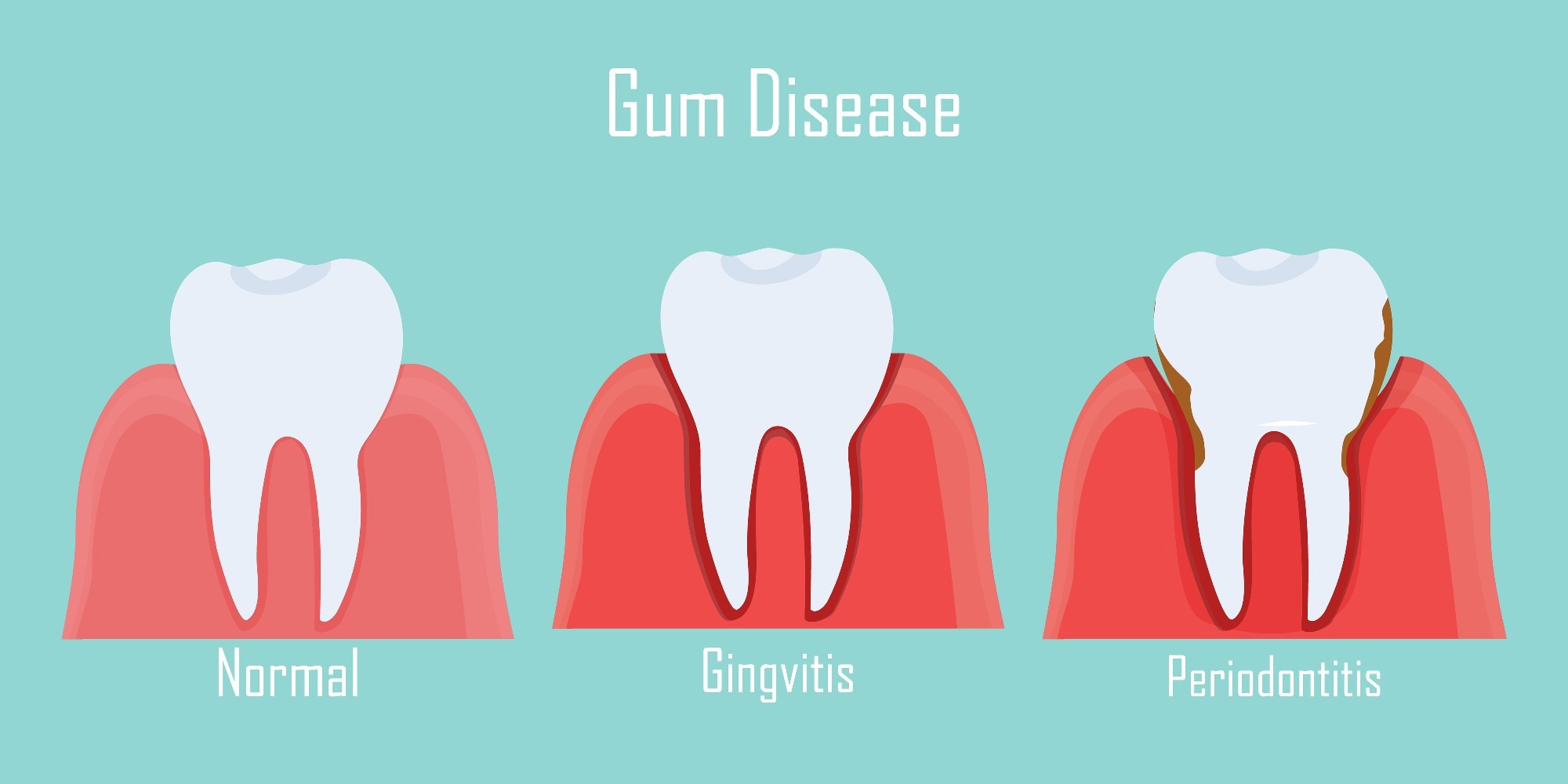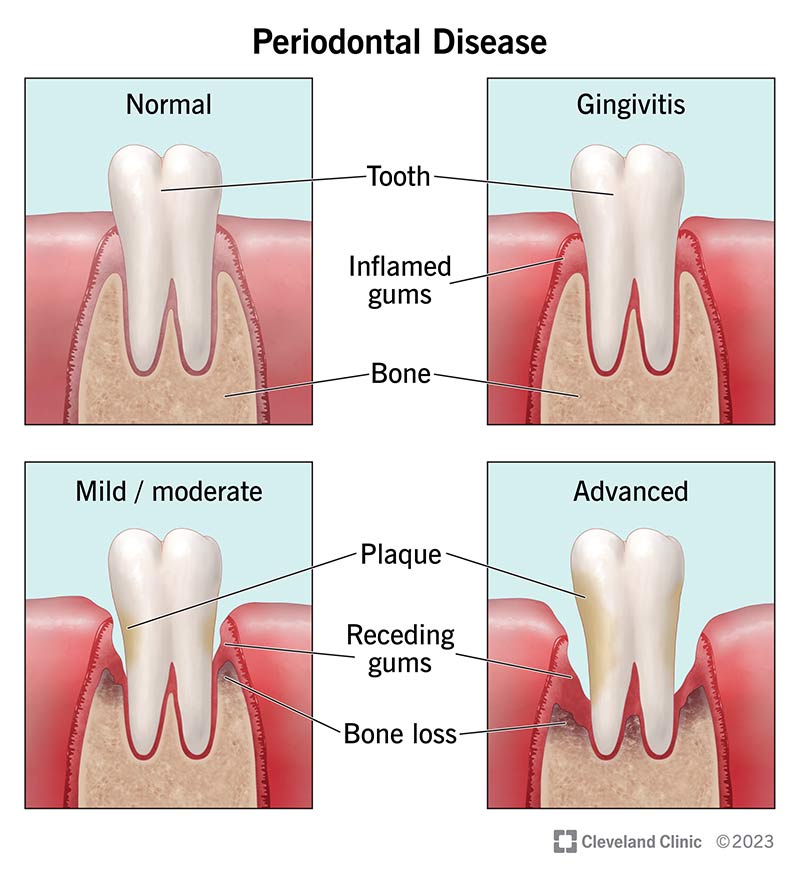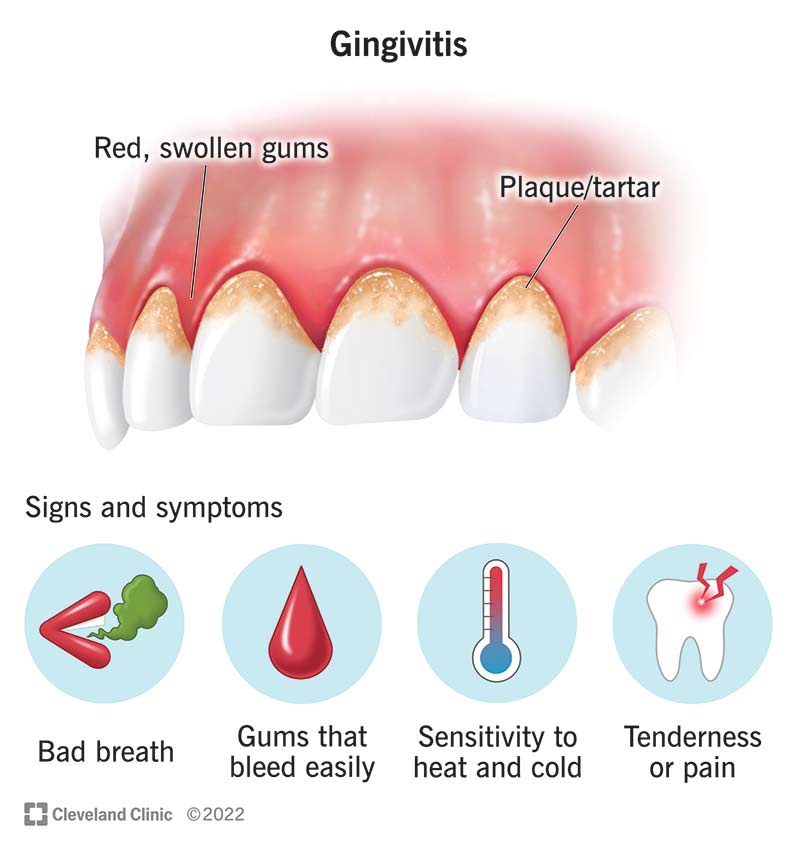Understanding Periodontal Disease
Periodontal disease, commonly known as gum disease, is a serious bacterial infection. It targets not just your gums, but also the tissues surrounding them. If left untreated, it can cause the bone around your teeth to dissolve. This is not a condition to be taken lightly.
What Causes Periodontal Disease?
The primary culprit behind periodontal disease is bacteria and plaque buildup. This sticky film of bacteria clings to your teeth and, if not properly cleaned, can lead to gum disease. Other factors can also contribute to this condition. These include a diet low in nutrients, smoking, autoimmune or systemic diseases, hormonal changes, bruxism, and excessive alcohol consumption.
Recognizing the Symptoms
The symptoms of gum disease can be subtle, but they are important to recognize. Common signs include red, swollen, tender gums. You might notice bleeding while brushing and flossing. Other signs are receding gums, loose or separating teeth, persistent bad breath, and pus between the teeth and gums. If you notice any of these symptoms, it’s time to visit a dentist or oral health specialist.
Gingivitis vs Periodontitis
There are different types of periodontal disease. The milder form is gingivitis. It can be reversed with proper oral hygiene.
However, if ignored, gingivitis can progress to periodontitis. This is a more advanced form of gum disease that can lead to tooth loss. Unlike gingivitis, periodontitis can cause long-term damage. It can lead to bone loss, loose teeth, gum recession, and tooth loss.
The Importance of Early Detection
Quick detection of gingivitis or periodontitis reduces the risk of developing periodontitis. Ignoring symptoms can lead to more serious consequences. Regular dental check-ups are crucial for early detection and treatment. Damage to the bone can be prevented with timely treatment.
Periodontal disease is a common condition, but it can be treated by dental professionals. The key is to catch it early and take action. Visit the American Dental Association website for more information on periodontal disease and how to prevent it. Remember, your oral health is in your hands. Don’t ignore the signs. Take action and keep your smile healthy.
Importance of Oral Hygiene
Maintaining good oral hygiene is a crucial part of your daily routine. It’s not just about having a bright, confident smile. It’s about keeping your mouth healthy and free from diseases like periodontal disease.
What is Oral Hygiene?
Oral hygiene is the practice of keeping your mouth clean and free from disease. It involves regular brushing and flossing to remove plaque and bacteria. But it doesn’t stop there. Regular dental exams and cleanings are also essential. They help ensure that your teeth and gums stay healthy.
Why is Oral Hygiene Important?
Good oral hygiene is your first line of defense against periodontal disease. This disease is caused by bacteria and plaque buildup on your teeth. Regular brushing and flossing can help reduce this buildup. But professional dental cleaning is also necessary. It removes tartar, a hardened form of plaque that can’t be removed by brushing alone.
Poor oral hygiene can lead to more than just gum disease. It can cause health complications like infective endocarditis and pregnancy complications. It can also increase your risk of adverse health conditions. So, maintaining good oral hygiene is crucial for your overall well-being.
How to Maintain Good Oral Hygiene?
Good oral hygiene starts with regular brushing and flossing. Brush your teeth at least twice a day and floss daily. This will help remove plaque and food particles from your teeth.
Avoid sugary snacks and drinks. They can lead to tooth decay and gum disease. Instead, opt for a balanced diet rich in fruits, vegetables, and dairy products.
Tobacco products are a big no-no. They can cause gum disease and oral cancer. So, if you’re a smoker, consider quitting.
Rinse your mouth with water after meals. This can help remove food particles and reduce plaque buildup.
Visit your dentist regularly. Dental exams and cleanings can help detect any oral conditions early. They can also help create a unique dental plan based on your individual needs.
Preventive Dental Care
Preventive dental care is key to maintaining good oral health. Regular dental checkups can help detect problems early, before they become serious.
Consider visiting Locust Family Dentistry every six months for regular dental exams and cleaning. They offer preventive dental care that can help keep your mouth healthy.
Oral Hygiene and Periodontal Disease
Remember, periodontal disease is a serious condition. But with good oral hygiene, you can prevent it. Brush and floss regularly. Eat a healthy diet. Avoid tobacco products. And don’t forget to visit your dentist regularly.
Your oral health is in your hands. So, take action. Keep your mouth clean and healthy. And keep that smile bright and confident.
Natural Remedies for Periodontal Disease
Periodontal disease is a serious condition. But don’t worry, there are natural remedies that can help reverse it. These remedies are simple, affordable, and you can do them right at home.
Saltwater Rinse
Saltwater rinse is a classic home remedy. It’s believed to treat gum disease effectively. How does it work? It cleans your teeth and gums and flushes bacteria from gum pockets.
You can make a saltwater rinse at home. Just mix a teaspoon of salt into a small glass of warm water. Rinse around your mouth for 15-30 seconds, spit the water out, and repeat. Do this at least three times a day.
Saltwater rinse can remove plaque and bacteria. It can also heal inflamed or swollen gums. However, it’s important to remember that while it improves oral hygiene, it doesn’t cure gum disease. For that, professional help is recommended.
Oil Pulling
Oil pulling is an ancient practice. It’s used for “purifying” the body. The process involves swishing oil in your mouth for 15-20 minutes to remove toxins.
Coconut oil is a popular choice for oil pulling. It has anti-inflammatory, antimicrobial, and antioxidant properties. These properties can help reduce harmful bacteria in the mouth and treat gum disease.

While oil pulling can be beneficial, it should not replace proper dental hygiene practices. Also, be aware of potential risks such as allergies and accidental ingestion of oil.
Dietary Changes
Your diet plays a crucial role in your oral health. A balanced diet rich in fruits, vegetables, and dairy products can help maintain good oral hygiene.
Certain minerals like calcium and phosphorus contribute to dental health. Fruits and vegetables are good choices for a healthy smile. Water, especially fluoridated water, is the best drink for teeth.
Avoid sugary snacks and drinks. They can lead to tooth decay and gum disease. Also, tobacco products are a big no-no. They can cause gum disease and oral cancer.
Professional Help
While these natural remedies can help improve your oral health, they are not a cure for periodontal disease. Regular dental visits and professional cleanings are essential.
Consider visiting Locust Family Dentistry every six months for regular dental exams and cleaning. They offer preventive dental care that can help keep your mouth healthy.
Remember, your oral health is in your hands. So, take action. Keep your mouth clean and healthy. And keep that smile bright and confident.
Role of Vitamins and Diet in Oral Health
When it comes to maintaining a healthy mouth, the food you eat plays a significant role. A balanced diet rich in vitamins and nutrients can help keep your gums healthy and prevent periodontal disease.
The Power of Vitamin C
Vitamin C is a powerhouse for oral health. It’s known for promoting tissue regeneration and preventing gum disease. You can find this essential vitamin in citrus fruits, tomatoes, potatoes, broccoli, kale, bell peppers, avocado, carrot, and asparagus.
However, it’s important to note that excessive intake of vitamin C can lead to enamel erosion and damage to your teeth. To counteract this, consider brushing your teeth or rinsing your mouth with water after consuming foods high in vitamin C. Also, be mindful of chewable supplements as they may be high in acidity and harmful to your enamel.
Omega-3 Fatty Acids: Your Gum’s Best Friend
Omega-3 fatty acids are another key player in oral health. They have anti-inflammatory properties that ease inflammation and slow the growth of bacteria that cause gum disease. Research shows that people with high levels of DHA in their diet have a reduced risk of periodontitis, a severe form of gum disease that can lead to tooth loss, bad breath, and swollen and bleeding gums.
You can incorporate Omega-3 fatty acids into your diet through supplements or by eating foods rich in Omega-3s like fish, flaxseeds, and walnuts. However, if you have a bleeding disorder or are on blood thinners, consult your doctor before increasing your intake of Omega-3s.
Good Nutrition for a Healthy Mouth
Good nutrition is vital for maintaining a healthy mouth.

Malnutrition can negatively affect your oral health and vice versa. Inflammation, a dominant factor in many chronic diseases, including periodontal diseases, can be mitigated with a balanced diet.
Remember, your oral health is linked to general health conditions like cardiovascular disease, diabetes, and respiratory diseases. Poor oral health can have negative effects on these conditions.
Oral Health: A Key to Overall Health
Taking care of your oral health involves good oral hygiene, regular dental visits, and a healthy lifestyle. Consider visiting Locust Family Dentistry every six months for regular dental exams and cleaning. They offer preventive dental care that can help keep your mouth healthy.
Remember, your oral health is in your hands. So, take action. Keep your mouth clean and healthy. And keep that smile bright and confident.
In the end, the health of our mouth is essential for our overall health and quality of life. So, let’s make sure we’re giving it the care it deserves.
Non-Surgical Treatments for Periodontal Disease
When it comes to treating periodontal disease, there are several non-surgical options available. These treatments can be highly effective, especially when the disease is caught early.
Antibiotics: A Powerful Ally
Antibiotics can be a potent tool in the fight against periodontal disease. They work by targeting bacterial infections in the gum tissue. When used effectively, they can prevent further tissue and tooth loss.
There are two main types of antibiotics used in dental treatments: oral and topical. Oral antibiotics are ingested and affect the whole body. They are less commonly prescribed due to their systemic effects. However, they can be highly effective in severe cases of periodontitis.
Topical antibiotics, on the other hand, are applied directly to the affected gum tissue. They come in various forms, including gels, chips, and strips. These treatments deliver relief directly to the infected area and can be especially effective after deep cleaning procedures like root planing and scaling.
Laser Dentistry: A Modern Approach
Another non-surgical treatment option is laser dentistry. This modern approach uses laser technology to selectively remove diseased or infected tissues and kill bacteria. It’s a breakthrough in the treatment of gum disease, preserving healthy gum tissue and minimizing dental discomfort.
Laser Bacterial Reduction is one such treatment. It destroys bacteria that cause inflammation and periodontal disease, reducing harmful bacteria levels within seconds.

This procedure is beneficial for moderate to serious cases of gum and bone disease.
Non-Surgical Periodontal Treatment
In some cases, non-surgical periodontal treatment may be an option for reversing periodontal disease naturally. This treatment includes procedures like scaling and root planing, a deep cleaning procedure that removes plaque and toxins from periodontal pockets.
Another option is the use of tray delivery systems. These involve custom-fit trays that deliver prescribed medications at home. However, it’s important to discuss all available treatment options with a dental professional.
Prevention is the Best Cure
While these treatments can be effective, the best way to combat periodontal disease is to prevent it in the first place. Regular dental visits, good oral hygiene, and a healthy diet can all contribute to a healthy mouth.
Remember, your oral health is in your hands. So, take action. Keep your mouth clean and healthy. And keep that smile bright and confident.
In the end, the health of our mouth is essential for our overall health and quality of life. So, let’s make sure we’re giving it the care it deserves.
For more information on non-surgical treatments for periodontal disease, consider visiting Locust Family Dentistry. They offer preventive dental care that can help keep your mouth healthy.
Signs of Healthy Gums
Healthy gums are the unsung heroes of a radiant smile. They’re the guardians of your teeth, and their health is crucial for your overall oral well-being. But how can you tell if your gums are healthy? Here are some signs to look out for.
Color and Texture
Healthy gums have a light coral pink hue, although this can vary depending on your skin tone. They’re firm, not soft or spongy. When you run your tongue over them, they feel like the surface of an orange, not a tomato.
No Pain or Discomfort
Healthy gums are painless. They don’t hurt or feel uncomfortable when you brush, floss, or eat hard foods. If you experience pain or sensitivity, it’s a red flag that something’s not right.
No Bleeding
Bleeding gums are a common sign of gum disease. If you see blood when you brush or floss, it’s time to take action. Healthy gums should not bleed or feel tender.
Fresh Breath
Bad breath can be a sign of unhealthy gums. If you notice an unpleasant smell when you floss, it could indicate a buildup of plaque and bacteria, a sign of gum disease. Healthy gums usually mean fresh breath.
Strong and Steady Teeth
Your gums are the foundation of your teeth. If your teeth are loose or wiggling, it could be a sign of gum disease. Healthy gums hold your teeth firmly in place.
Regular Dental Check-ups
Regular dental visits are essential for maintaining gum health.

Your dentist can detect early signs of gum disease before they become serious. The American Dental Association recommends a dental check-up every six months.
Good Oral Hygiene
Healthy gums are a result of good oral hygiene. Regular brushing and flossing remove plaque and food particles that can cause gum disease. Choose an ADA-approved toothpaste and a soft-bristled brush for effective cleaning.
Healthy Diet
Your diet plays a significant role in your gum health. Foods rich in calcium help maintain strong teeth and gums. Avoid sticky sweets and opt for a balanced diet for optimal oral health.
Remember, your gums are a reflection of your oral hygiene habits. Keep them healthy by brushing and flossing regularly, eating a balanced diet, and visiting your dentist regularly. If you notice any signs of unhealthy gums, don’t ignore them. Seek professional help from a trusted dental clinic like Locust Family Dentistry.
Your smile is your best accessory. So, let’s keep it bright and healthy by taking care of our gums. After all, a healthy mouth is a gateway to a healthy body and a happier you.


